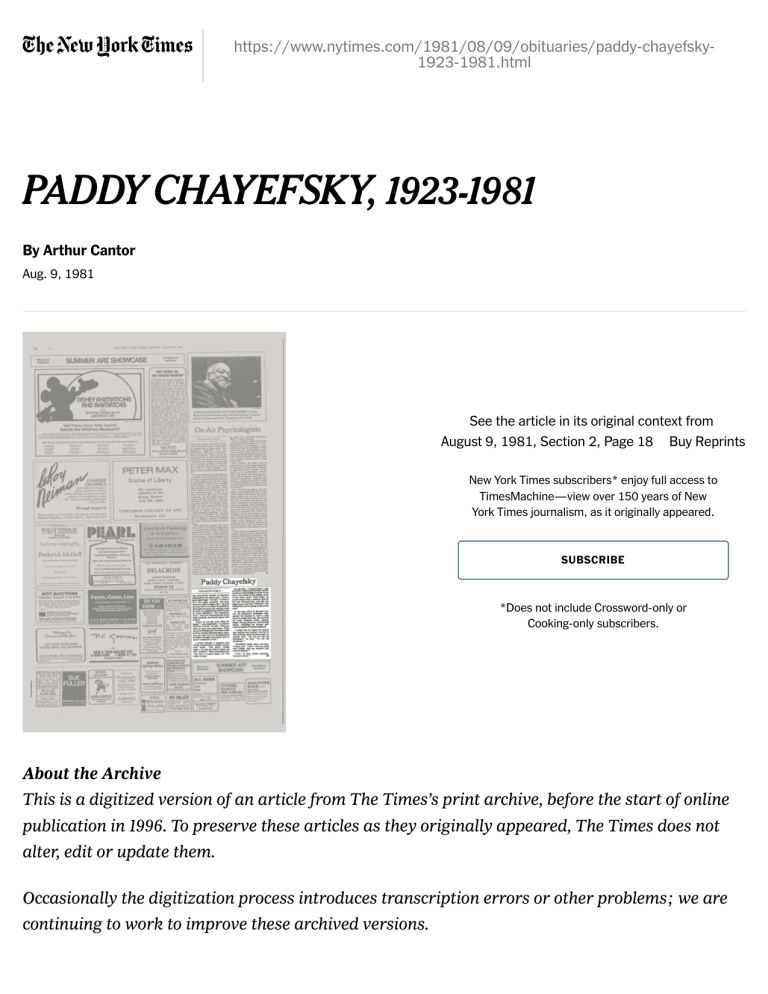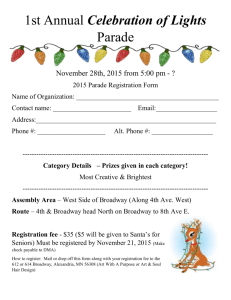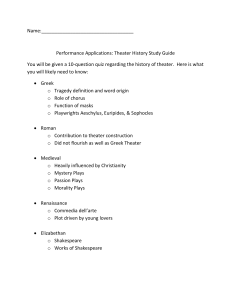
https://www.nytimes.com/1981/08/09/obituaries/paddy-chayefsky1923-1981.html PADDY CHAYEFSKY, 1923-1981 By Arthur Cantor Aug. 9, 1981 See the article in its original context from August 9, 1981, Section 2, Page 18 Buy Reprints New York Times subscribers* enjoy full access to TimesMachine—view over 150 years of New York Times journalism, as it originally appeared. SUBSCRIBE *Does not include Crossword-only or Cooking-only subscribers. About the Archive This is a digitized version of an article from The Times’s print archive, before the start of online publication in 1996. To preserve these articles as they originally appeared, The Times does not alter, edit or update them. Occasionally the digitization process introduces transcription errors or other problems; we are continuing to work to improve these archived versions. Paddy Chayefsky died on Saturday, Aug. 1, in the final act of a life as complex and colorful as anything he wrote, and in the middle of his return to the theater he viewed with love and anguish. He had not written a play for 17 years, but at the time of his death he was working on a new drama. And memories of those gentler years when he was one of Broadway's most active and imaginative playwrights flood back to his friends and colleagues -and I am proud to have been one of them. Between 1959 and 1964, I co-produced three plays by Paddy Chayefsky on Broadway. ''The Tenth Man'' in 1959, a comedy set in an Orthodox synagogue, marked a great leap forward from the easy naturalism of the first Chayefsky theater work, ''Middle of the Night,'' and displayed his gift for picturesque speech and penchant for themes of mysticism. It ran for two years in New York and a year on the road. Also successful was ''Gideon'' in 1961, which starred Fredric March and was loosely adapted from the Old Testament. Again, Paddy enlarged the canvas of his imagination and the bravura of his language. ''Gideon'' ran for a season. In 1964, he wrote his most ambitious play, ''The Passion of Josef D,'' an audacious large-cast vaudeville about Josef Stalin and the Russian Revolution. It was for him a frankly experimental work, and it failed swiftly and stunningly. Paddy was deeply hurt by the divided notices for ''Josef D,'' and by the cruel and characteristic melting-away of audiences after mixed reviews. ''I will never write another play for Broadway,'' he told me and others. I thought he was kidding. But he kept his word. He had already finished another play - ''The Latent Heterosexual'' - but he would not permit it to be done in New York. For the next 16 years, he threw his fierce creative energies exclusively into films, two of which - ''Hospital'' and ''Network'' - won him Academy Awards (he had earlier won his first Oscar for ''Marty'' in 1955). I would call him periodically during the non-theatrical years, urging him to write again for the stage. ''It takes me two or three years to write a play,'' he would say. ''All that time and effort deserve more than a two-week run.'' ''But three of your four plays were successful. You're way ahead on percentages,'' I once said. ''I'm a writer, not a statistician,'' he replied. The touching part of this immovable self-imposed exile was that Paddy to the day of his death never stopped being a man of the theater he idolized and dreaded. When we first met in 1954, a gentler year, on the crest of the wave of television triumph, he complained about the ephemeral nature of television ''one one-night stand after another,'' he described the medium - and spoke longingly of how he would like to have a full-length play produced in the theater, ''where live people watch live actors bringing words to life.'' And in the little office on Seventh Avenue where he wrote to a typical Manhattan discipline, punctuated by telephone calls, pastrami sandwiches and continual visits from his friends, he would fill dozens of dime-store notebooks with disquisitions in longhand on the scenes and characters he was creating. He rarely wrote dialogue in these preliminary discussions with himself. Almost in the shape of catechisms, he would endlessly write himself questions about his individuals and images. ''What am I trying to say in this scene?'' he would ask himself. ''Should I try a different setting? If so, where?'' ''What's the girl's relationship with her father?'' And he would answer his own questions, still in longhand, in page after self-probing page. Months later, he would start the play on the typewriter. While he enjoyed reading and writing avant-garde theater, he believed profoundly in the linear play. ''To be a good playwright,'' he said, ''is first of all to be a good carpenter. Get your structure right to begin with.'' He told me once that in his youth he decided to learn play-structure by copying, word by word, in longhand the entire script of Lillian Hellman's ''The Children's Hour,'' which he considered one of the most carefully structured plays ever written. ''Where do you get your ideas for plays?'' I once asked him. ''A writer's life is his crucible,'' he said. ''First you draw on your own experience. When you have drained your own experience or have stopped experiencing in quantity, you must draw on the experience of others through observation and research. Research is vital.'' I always thought it poignant that Paddy viewed his film scripts in theatrical terms. ''The play's almost ready,'' he told me shortly before the film ''Hospital'' went into production. ''Act One is in good shape. Act Two needs cutting.'' His last film, ''Altered States,'' was involved in heavy controversy, and he would not acknowledge it except to say that it was based on his original novel of the same name. Once more, he turned away from a medium that he felt had betrayed him, and like the angry ones in the film ''Network'' was mad as hell and not going to take it any more. In the little office on Seventh Avenue, the dime-store notebooks reappeared. He decided to write a play about the Alger Hiss case. He went into his usual research mode, reading books, visiting libraries, interviewing people, analyzing his thought processes in pages of restless longhand. I called him for lunch six months ago, told him how thrilled I was that he was working, after all these years, on another play. ''Oh, but it's not for Broadway,'' he said. ''It's for Off Broadway.'' ''Broadway needs plays and playwrights, too,'' I said. ''Are you really sure, Paddy, that you wouldn't consider Broadway?'' ''Well,'' he said, almost mellowly, ''you never know.''


